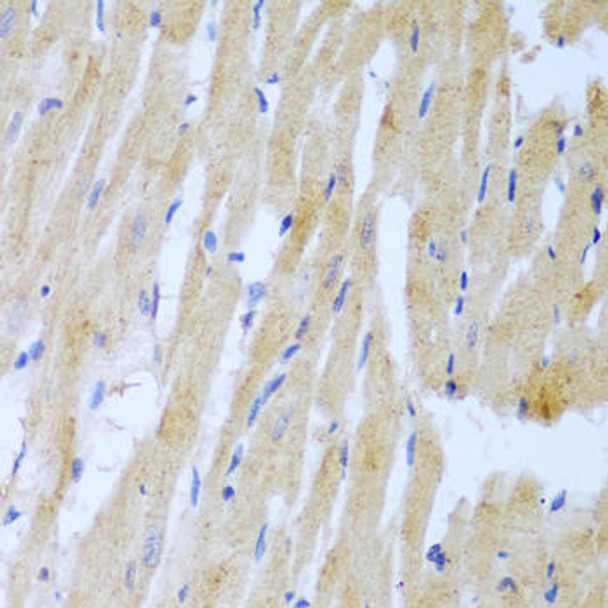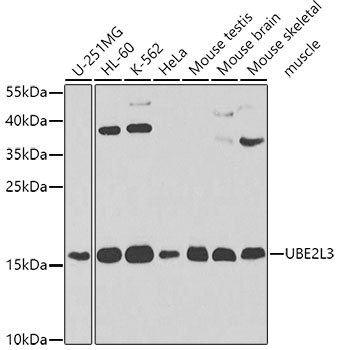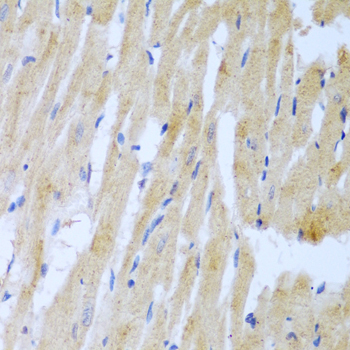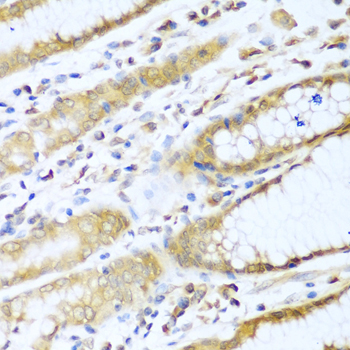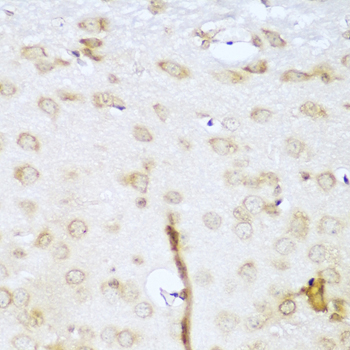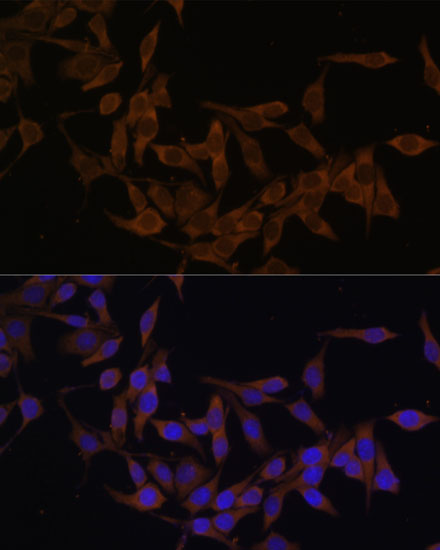Anti-UBE2L3 Antibody (CAB4175)
- SKU:
- CAB4175
- Product type:
- Antibody
- Reactivity:
- Human
- Mouse
- Rat
- Host Species:
- Rabbit
- Isotype:
- IgG
- Research Area:
- Epigenetics and Nuclear Signaling
Description
| Antibody Name: | Anti-UBE2L3 Antibody |
| Antibody SKU: | CAB4175 |
| Antibody Size: | 20uL, 50uL, 100uL |
| Application: | WB IHC IF |
| Reactivity: | Human, Mouse, Rat |
| Host Species: | Rabbit |
| Immunogen: | Recombinant fusion protein containing a sequence corresponding to amino acids 73-212 of human UBE2L3 (NP_001243284.1). |
| Application: | WB IHC IF |
| Recommended Dilution: | WB 1:1000 - 1:2000 IHC 1:50 - 1:100 IF 1:50 - 1:200 |
| Reactivity: | Human, Mouse, Rat |
| Positive Samples: | U-251MG, HL-60, K-562, HeLa, Mouse testis, Mouse brain, Mouse skeletal muscle |
| Immunogen: | Recombinant fusion protein containing a sequence corresponding to amino acids 73-212 of human UBE2L3 (NP_001243284.1). |
| Purification Method: | Affinity purification |
| Storage Buffer: | Store at -20°C. Avoid freeze / thaw cycles. Buffer: PBS with 0.02% sodium azide, 50% glycerol, pH7.3. |
| Isotype: | IgG |
| Sequence: | RKCG MKNF RNIQ VDEA NLLT WQGL IVPD NPPY DKGA FRIE INFP AEYP FKPP KITF KTKI YHPN IDEK GQVC LPVI SAEN WKPA TKTD QVIQ SLIA LVND PQPE HPLR ADLA EEYS KDRK KFCK NAEE FTKK YGEK RPVD |
| Gene ID: | 7332 |
| Uniprot: | P68036 |
| Cellular Location: | Cytoplasm, Nucleus |
| Calculated MW: | 14kDa/17kDa/24kDa |
| Observed MW: | 18kDa |
| Synonyms: | UBE2L3, E2-F1, L-UBC, UBCH7, UbcM4 |
| Background: | The modification of proteins with ubiquitin is an important cellular mechanism for targeting abnormal or short-lived proteins for degradation. Ubiquitination involves at least three classes of enzymes: ubiquitin-activating enzymes (E1s), ubiquitin-conjugating enzymes (E2s) and ubiquitin-protein ligases (E3s). This gene encodes a member of the E2 ubiquitin-conjugating enzyme family. This enzyme is demonstrated to participate in the ubiquitination of p53, c-Fos, and the NF-kB precursor p105 in vitro. Several alternatively spliced transcript variants have been found for this gene. |
| UniProt Protein Function: | UBE2L3: Ubiquitin-conjugating enzyme E2 that specifically acts with HECT-type and RBR family E3 ubiquitin-protein ligases. Does not function with most RING-containing E3 ubiquitin-protein ligases because it lacks intrinsic E3-independent reactivity with lysine: in contrast, it has activity with the RBR family E3 enzymes, such as PARK2 and ARIH1, that function like function like RING-HECT hybrids. Accepts ubiquitin from the E1 complex and catalyzes its covalent attachment to other proteins. In vitro catalyzes 'Lys-11'-linked polyubiquitination. Involved in the selective degradation of short-lived and abnormal proteins. Down- regulated during the S-phase it is involved in progression through the cell cycle. Regulates nuclear hormone receptors transcriptional activity. May play a role in myelopoiesis. Interacts with PARK2; involved in ubiquitination and degradation of misfolded proteins. Interacts with UBE3A; used by the papilloma virus HPV-16 E6 protein to ubiquitinate p53/TP53. Interacts with CCNB1IP1, CBL, ZAP70, RNF19A, RNF19B and RNF144B. Interacts with ARIH1. Interacts with ARIH2 (via RING-type 1). Interacts with NCOA1; they functionally interact to regulate progesterone receptor transcriptional activity. May interact with NR3C1. Ubiquitous, with highest expression in testis. Belongs to the ubiquitin-conjugating enzyme family. |
| UniProt Protein Details: | Protein type:Nuclear receptor co-regulator; Ubiquitin conjugating system; EC 6.3.2.19; Ubiquitin ligase; Ligase Chromosomal Location of Human Ortholog: 22q11.21 Cellular Component: cytoplasm; nucleus; ubiquitin ligase complex Molecular Function:protein binding; enzyme binding; ubiquitin protein ligase binding; transcription coactivator activity; ubiquitin-protein ligase activity; ATP binding; ligase activity Biological Process: ubiquitin-dependent protein catabolic process; cell proliferation; protein polyubiquitination; regulation of transcription, DNA-dependent; transcription, DNA-dependent; positive regulation of protein ubiquitination; positive regulation of ubiquitin-protein ligase activity; protein modification process; protein ubiquitination |
| NCBI Summary: | The modification of proteins with ubiquitin is an important cellular mechanism for targeting abnormal or short-lived proteins for degradation. Ubiquitination involves at least three classes of enzymes: ubiquitin-activating enzymes (E1s), ubiquitin-conjugating enzymes (E2s) and ubiquitin-protein ligases (E3s). This gene encodes a member of the E2 ubiquitin-conjugating enzyme family. This enzyme is demonstrated to participate in the ubiquitination of p53, c-Fos, and the NF-kB precursor p105 in vitro. Several alternatively spliced transcript variants have been found for this gene. [provided by RefSeq, Sep 2009] |
| UniProt Code: | P68036 |
| NCBI GenInfo Identifier: | 54039805 |
| NCBI Gene ID: | 7332 |
| NCBI Accession: | P68036.1 |
| UniProt Related Accession: | P68036 |
| Molecular Weight: | |
| NCBI Full Name: | Ubiquitin-conjugating enzyme E2 L3 |
| NCBI Synonym Full Names: | ubiquitin conjugating enzyme E2 L3 |
| NCBI Official Symbol: | UBE2L3 |
| NCBI Official Synonym Symbols: | E2-F1; L-UBC; UBCH7; UbcM4 |
| NCBI Protein Information: | ubiquitin-conjugating enzyme E2 L3 |
| UniProt Protein Name: | Ubiquitin-conjugating enzyme E2 L3 |
| UniProt Synonym Protein Names: | L-UBC; UbcH7; Ubiquitin carrier protein L3; Ubiquitin-conjugating enzyme E2-F1; Ubiquitin-protein ligase L3 |
| UniProt Gene Name: | UBE2L3 |
| UniProt Entry Name: | UB2L3_HUMAN |

